[/caption]CAPE CANAVERAL – An Atlas V rocket carrying a highly sophisticated Space-Based Infrared System (SBIRS) GEO-1 satellite for the United States Air Force lifted off from the seaside Space Launch Complex-41 at 2:10 p.m. EDT on Saturday (May 7) into a gorgeous clear blue sky following a one day delay due to cloudy weather conditions surrounding the Florida space coast on Friday.
SBIRS GEO-1 is the maiden satellite in a new constellation of next generation military space probes that will provide US military forces with an early warning of missile launches that could pose a threat to US national security.
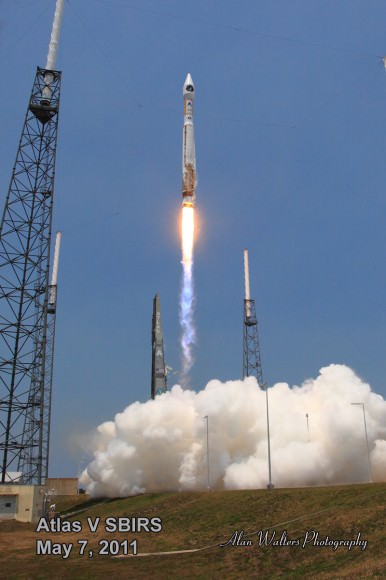
Credit: Alan Walters/awaltersphoto.com
The planned quartet of SBIRS satellites will deliver a quantum leap in infrared event detection and reporting compared to the current generation of orbiting Defense Support Program (DSP) satellites, according to Michael Friedman of Lockheed Martin in an interview with Universe Today at the Kennedy Space Center (KSC).
“The SBIRS GEO satellites will have both a scanning and starring sensor with faster revisit rates. They will be able to detect missile launches from the earliest stages of the boost phase and track the missiles to determine their trajectory and potential impact points,” said Friedman.
“SBIRS can see targets quicker and characterize the actual missile,’” explained Steve Tatum of Lockheed Martin at KSC.
In addition to providing improved and persistent missile warning capabilities in a global arena, SBIRS will simultaneously support missile defense, technical intelligence, battlespace awareness and defense of the US homeland.
“The 10,000 pound SBIRS GEO-1 satellite is the size of two Hummers. About 9000 people in 23 states were involved in constructing the satellite.”
“SBIRS GEO-2 will launch in the next year or two,” Friedman told me.
“GEO-2 is built and undergoing testing now,” added Tatum.
The $1.2 Billion SBIRS satellite was launched into a 22,000 mile high Geosynchronous orbit by the 189 foot tall Atlas V rocket. The Atlas rocket was in the 401 vehicle configuration with no solid rocket motors and includes a 4-meter diameter payload fairing.
The first stage was powered by the RD AMROSS RD-180 engine and the Centaur upper stage was powered by a single Pratt & Whitney Rocketdyne RL-10A engine.
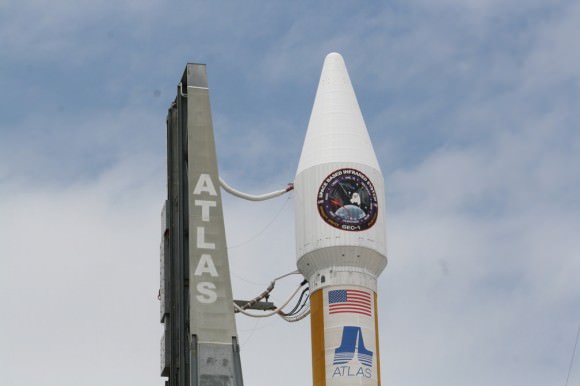
The Atlas V rocket was built and launched by United Launch Alliance (ULA). This marks the 50th successful launch for ULA since the company was formed in December 2006.
“With this launch, ULA continues to demonstrate its commitment to 100 percent mission success,” said Michael Gass, ULA President and CEO. “This milestone is a testament to the dedicated employees that for every mission deliver excellence, best value and continuous improvement to our customers.”
Read my Atlas V SBIRS preview story here:
Atlas Rocket Poised for Blast Off with Advanced Missile Early Warning Spy Satellite
SBIRS GEO-1 Launch Photo Album by the Universe Today team of Ken Kremer and Alan Walters:
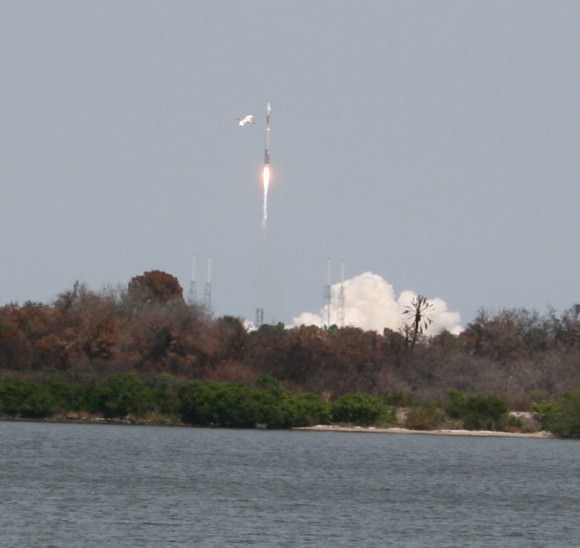
Liftoff of Atlas V rocket with SBIRS GEO-1 satellite as an Egret flies into camera field of view on May 7, 2011 at 2:10 p.m. EDT. View from the Press Site at the Kennedy Space Center:
Credit: Ken Kremer -- kenkremer.com
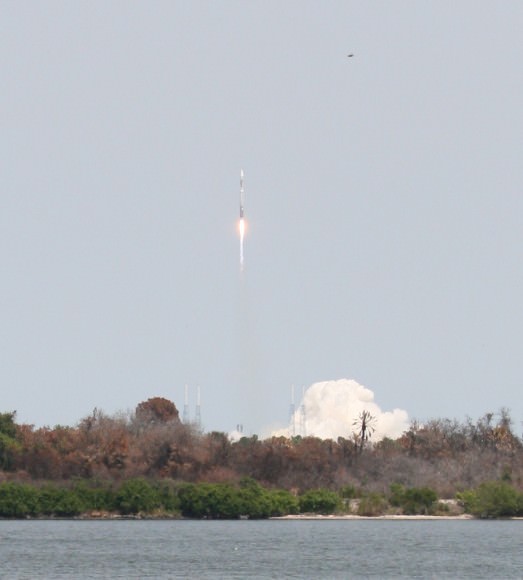
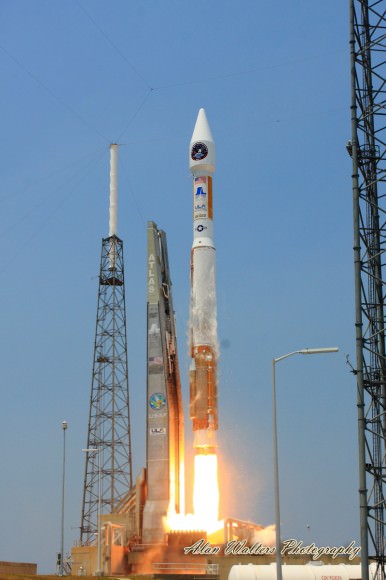
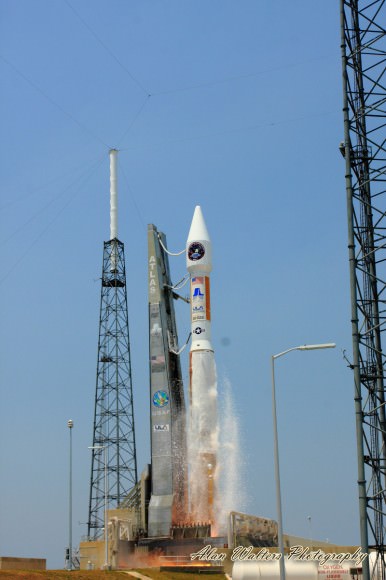
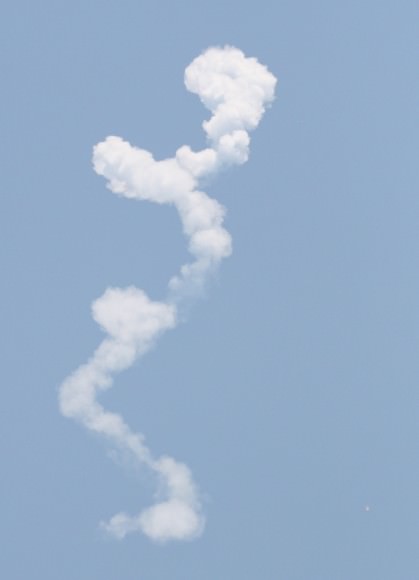
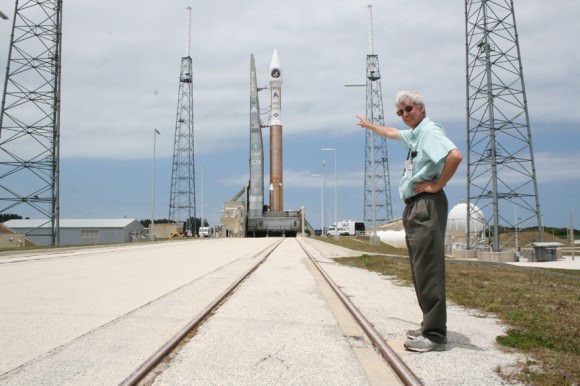

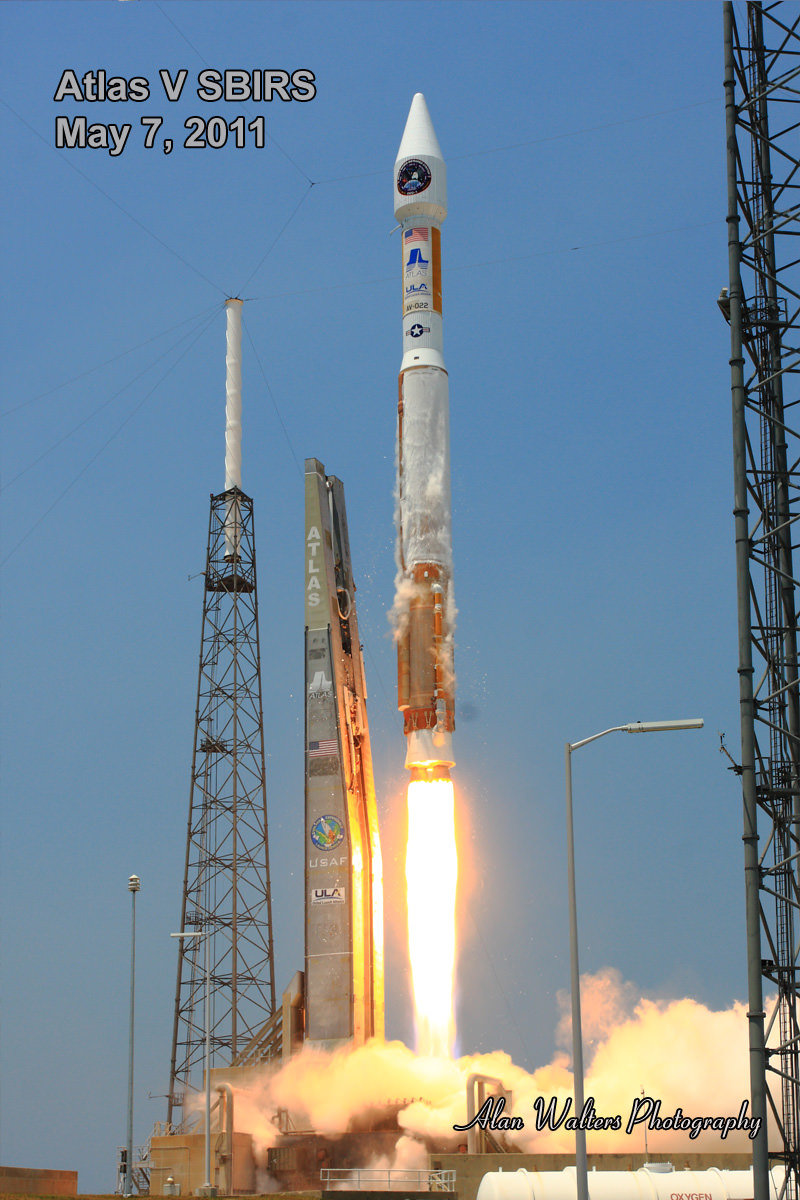
Are we plotting another World War?
No, just insuring that someone else can’t fire the first shots of one, without our knowing right away…
Or do you suggest we’d be better off blind?
No, I suggest we all disarm.
…and then somebody will come long and beat us with stones (and I’m not american!)
Or mutually respect us for seeking friendly, honest relationships. Take Canada’s stance for example. They enjoy good/stable diplomatic relations with most nations and enjoy a tin-pot army.
Too much enjoying! Grr.. I wish UT had an edit function.
No, just appeasing congressmen, big businesses, and military officials eager to pad their resumes. Of course large portions of the public value the few high tech jobs created in their constituencies, while the defense posturing makes them feel safe. It seems like every week the air force is launching something top secret.
Of course, hijacking international space for US military operations is productive to international diplomatic efforts by facilitating mutual trust. Stabbing our friends and enemies in the back via spy satellites is the most prudent way to ensure better long term international relations.
Being sarcastic here and just generally frustrated at the lack of create solutions by a sort term rewarding political system.
“Of course, hijacking international space for US military operations…”
Everyone’s military has used international waters and international airspace from day one. Nothing new here, nothing ‘hijacked’ here. (And no weapons here either, just passive observation. Orbital mechanics doesn’t care about borders…the US let the Soviets set that precedent first, to insure they couldn’t logically object to satellite ‘overflights’ later.)
Indeed, the very notion of ‘hijacking space’ (and without qualifiers, ‘space’ is the entire Universe, except the first 100km around this one planet) strikes me as a bit absurd.
Just in case you missed it: there haven’t been any Soviets in almost exactly 20 years…
😉
Just in case /you/ missed it: when referencing events in past tense people often refer to countries and peoples as they were, not as they are. It’s less confusing that way ;).
I *wish* that we could spend a quarter as much money putting up satellites to look for NEO’s as we do putting up spy equipment. It just feels like we’re looking in the rear view mirror while speeding ahead at full throttle. A 1 KM bolide poses a threat that is easily on par with anything we’re going to see from some misguided dictatorship.
I’m shouting into the void I suppose, but a meteor strike seems like a hell of a lot more threatening than some ideological lack wit with a shoe bomb.
I beleave we are on the verge of a NEW cold war… Sad but true!
The Dragon is wakng up and the Bear has decided that eatting bean sprouts doesn’t get it when he see’s a big flopping fish on the shore,that can’t seem to make it back into the water. The perfect world would be that everybody come together,give each other flowers and sing the song “WE are the World”.